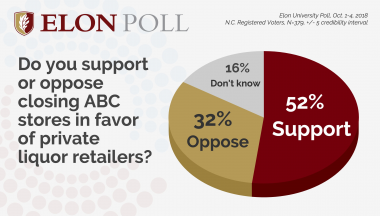The poll, conducted in collaboration with the N.C. General Assembly Program Evaluation Division, also found that about half the state agrees with keeping ABC stores closed on Sunday.
FULL REPORT with METHODOLOGY AND CROSSTABS
A recent Elon University Poll has found that a majority of North Carolinians support changing how the state regulates retail liquor sales, with 52 percent in favor of the state closing ABC stores and allowing private businesses to sell liquor.
 The poll, conducted in collaboration with the N.C. General Assembly Program Evaluation Division, also found that a majority of state residents — 52 percent — believe that ABC stores should continue to be closed on Sunday, a long-standing restriction on retail liquor sales in the state.
The poll, conducted in collaboration with the N.C. General Assembly Program Evaluation Division, also found that a majority of state residents — 52 percent — believe that ABC stores should continue to be closed on Sunday, a long-standing restriction on retail liquor sales in the state.
In both cases, the most popular opinion was held by only a slim majority of those surveyed, with neither enjoying overwhelming support.
“We found no consensus among North Carolina voters when it comes to privatizing ABC stores or allowing liquor sales on Sundays,” said Jason Husser, director of the Elon Poll and associate professor of political science. “A very slim majority support closing ABC stores in favor of private businesses, and a similar majority wanted ABC stores to remain closed on Sunday.”
Results of the survey were included in the state legislature’s report, “Changing How North Carolina Controls Liquor Sales Has Operational, Regulatory, and Financial Ramifications,” which was released Monday, Feb. 11, and is available online. The report was presented to the Joint Legislative Program Evaluation Oversight Committee.
The live-caller, dual-frame (landline and cell phone) survey of 379 registered voters in North Carolina was conducted Oct. 1-4, 2018. Survey results in this news release have a margin of error of +/- 5 percent.
ABC stores or private retailers?
While more than half of respondents were in favor of closing ABC stores, about a third — 32 percent — weighed in in opposition to that idea, while another 16 percent said they didn’t know.
Whether a person shops at ABC stores appears connected to whether they believe ABC stores should remain open or should close in favor of private retailers. Among those who do not shop at ABC stores, half oppose their closure. The rate was much lower for those who do shop at ABC stores, with about one in four — 26 percent — opposing their closure.
Similarly, ABC store shoppers were more likely support their closure compared to those who don’t shop there. Fifty-eight percent support ABC stores shutting their doors while 34 percent of nonshoppers support closure.
Closed on Sunday
State law prohibits ABC stores from opening on Sunday, and a majority of respondents want it to stay that way. Fifty-two percent say they should remain closed on Sunday while 37 percent say they should be open and 10 percent saying “don’t know.”
Those who don’t shop at ABC stores were far more likely to say the Sunday sales ban should continue. Seventy percent of nonshoppers held that view compared to 46 percent of those who do shop at ABC stores. Only 16 percent of nonshoppers believe ABC stores should be open on Sunday, compared to 44 percent of shoppers.
There was a clear divide along party lines, too. While 45 percent of Democrats were in favor of allowing ABC stores to conduct sales on Sunday, only 22 percent of Republicans held that view. Similarly, 70 percent of Republicans support the current prohibition of Sunday sales at ABC stores while 45 percent of Democrats shared that view.
“That support for Sunday sales varied substantially by party and use of ABC stores suggests to me that some local autonomy for Sunday liquor sales might be popular among North Carolinians,” Husser said.
Who should sell?
If private retailers are allowed to sell liquor in North Carolina, those who already sell beer and wine were the most popular type of business to feature these expanded sales, the poll has found.
Fifty-seven percent of respondents said beer and wine retailers should also be allowed to sell liquor while 37 percent said sales should be limited to those who agree to only sell liquor. Eight percent of respondents said they don’t know what the best option is while 4 percent said, “Something else.”


